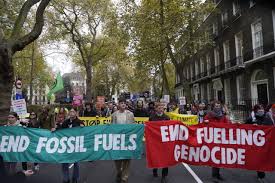There is No Climate Justice without Human Rights
'Every day, they stop at nothing to maximize their profits, fueling genocide, corrupting politics and pushing our climate closer to collapse'

by Majidah Chowdhury, BA International Relations 09/12/2024
Climate action in the UK has taken its form in numerous ways; from high profile court cases, to public demonstrations and the efforts of collective unions. Recently, notable calls to action demonstrate the shift in the type of activism, putting more of a focus on the global implications of the global climate crisis.
The Rosebank Court Case
In September 2023 the UK government approved the development of the Rosebank oil field in the North West of the Shetland Islands, containing 500 million barrels worth of non-renewable energy sources. The decisions made by the former Secretary of State for Energy Security and Net Zero and the regulator, the North Sea Transition Authority (NSTA) are facing widespread opposition due to the failure of accurately assessing the damage Rosebank would cause to the environment. The fight in challenging the Supreme Court's ruling is currently being led by Uplift and Greenpeace.
In their judicial review, Uplift and Greenpeace have argued that the decision is unlawful since it will be incompatible with the governments climate commitments of reduced emission targets, set by the North Sea Transition Deal. Furthermore, the North Sea Transitional Authority has not given an adequate justification as to why the development was initially approved, lacking transparency towards the public, as well as disregarding the impact on marine life. The government also failed to assess the full extent of the subsequent environmental damage, burning the oil and gas will produce 200 million tonnes of CO2 annually, equivalent to the total emissions of 200 million people in the world’s least developed countries. Uplift and Greenpeace ultimately call for the cancellation of the development licence with the support of over 20,000 individuals and groups such as Extinction Rebellion, WWF and Oceana.
The firms involved — Shell, Equinor, and Ithaca Energy - argue that they should be allowed to continue with drilling as they were given the decisive permission to do so. If the court case succeeds, the government will have the opportunity to reconsider its decision. This would represent a significant milestone in the fight against climate change, and could set a strong standard for blocking new oil and gas projects - both in the United Kingdom and internationally.
Energy Embargo for Palestine
Energy Embargo for Palestine is an anti-imperialist climate collective in the UK designed to bridge the gap between climate injustice and Palestinian solidarity. Their focus stems from the belief that oil is the ‘lifesource of the Israeli war machine’, with energy resources currently being used to fund military operations and build settlements on Palestinian land.
One of their recent targets is Turkey, which has claimed its support for Palestinian liberation but continues to facilitate the flow of goods, including oil, to Israel through its ports and seas - accounting for around 50% of Israel's imports. This contradiction has spurred the group’s call for greater accountability from Turkey in its role in enabling Israeli military aggression.
The group's call to action includes: halting the flow of weapons into Israel, putting pressure on governments to cease the transport of energy and gas, global mobilisation behind Palestinian liberation and disrupting COP29 to bring attention to complicit companies, such as SOCAR, BP and Chevron. By cutting off Israel's access to energy, their military capacity would weaken, therefore losing the ability to fuel operations.
They have also targeted the British Museum for its ongoing partnership with BP, calling to boycott the institution for their complicity. BP continues in its gas exploration mission off the coast of Gaza which was approved by Israel in November 2023, despite the on going genocide of Palestinians. This reinforces the group’s stance on the need for direct action against corporate complicity in Israeli war crimes.
March for Global Climate Justice
On the 16th of November, more than 60 organisations and 1,000 protestors took to the streets demanding an end to the government's reliance on fossil fuels and complicity in the Palestinian genocide. The march started at the British Museum. The route then continued past SOCAR, which alongside BP, co-own the Baku-Tbilisi-Ceyhan pipeline, which supplies nearly 30% of Israel’s oil, and fuels military arsenal used in genocidal attacks in Gaza. The pipeline links the legacy of British imperialism with Israeli genocide and climate crisis.
Deputy Green Party Leader Zack Polanski, commented while supporting the march: “There’s a very obvious link where, if you have fossil fuel companies that don’t care about trashing the planet, then of course they don’t care about funding weapons and funding the military, which are enabling a genocide and killing people.”



